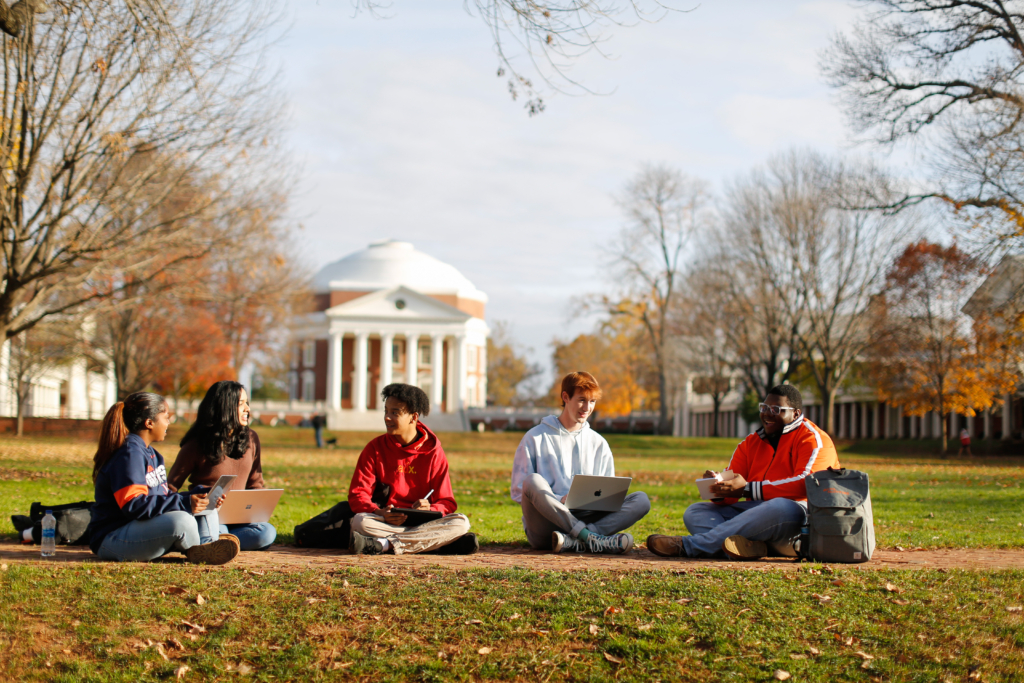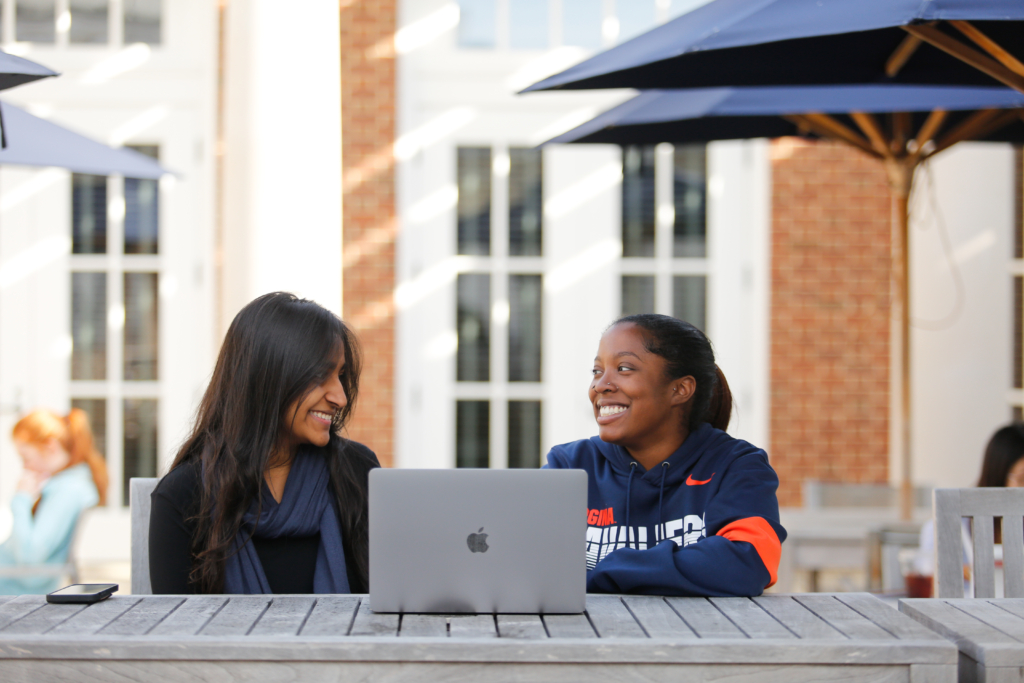
Students gathering outside the University of Virginia’s McIntire School of Commerce. Photo by Amanda Maglione
University of Virginia McIntire School of Commerce
Though it celebrated its 100 year anniversary just last year, University of Virginia’s McIntire School of Commerce is in the middle of a rebirth of sorts.
In 2020, it welcomed a new dean, Nicole Thorne Jenkins, who succeeded a dean who led the school for more than two decades. It’s erecting a new building, Shumway Hall, and renovating Cobb Hall in an expansion of its Commerce Complex, expected to be completed in 2025. And, it’s in the process of rethinking its undergraduate program from the perspective of the student.
“As we look toward the school’s next chapter, we have been deeply engaged in considering how we do what we do—and why,” says Roger Martin, director of McIntire’s undergraduate business program. “This has been a fascinating and insightful process—to really question what we thought we knew and to identify ways that we can continue to innovate and evolve the curriculum to support an exceptional student experience.”
Through it all, it has been a stalwart among the top undergraduate business programs in the country. It’s consistently been near the top of our undergraduate business rankings, landing at No. 8 on our inaugural ranking in 2017, and never falling below No. 5 since. It ranked No. 4 this year.
STRONG AND STEADY
This consistency is one of the reasons we picked it as our Undergraduate Business Program of the Year in 2019. It’s the same year McIntire’s B.S. in Commerce became the first non-specialized undergraduate business degree to receive the STEM designation.
One of only a handful of elite two-year programs, students at Virginia begin with two years of liberal arts developing a well-rounded foundation of academic pursuits of their choice, mostly outside of business, before applying to the McIntire School of Commerce for entry in their third year. For example, 23% of student applicants are admitted into UVA as first-year students; at the end of their second year they apply for a spot in the School of Commerce, which admitted 51.3% of its UVA applicants for 2022.
Two key McIntire differentiators are its Integrated Core Experience (ICE) and its global focus. ICE is a two-semester sequence of courses that student cohorts of about 50 students take together. “Content is integrated through team-teaching and a semester-long project in which the students address actual problems posed by a sponsoring company—problems that demand an integrative approach to understand and solve,” Martin tells P&Q.
Further, McIntire’s curriculum takes a global view of business across all courses. It offers a Global Commerce Track and a range of study abroad opportunities and international immersions.
It has led to particularly strong career outcomes for its Class of 2022 graduates, 97.83% of whom secured full-time employment after graduation. Further, starting average salaries shot up 11.79% over 2021, from $77,926 to $87,116. That’s the seventh highest salary increase over all schools in our 2023 ranking. Add in signing bonuses, and the latest crop of McIntire grads are pulling down an average adjusted total compensation of $94,206.
Its 13 top employers for the classes of 2021 and 2022 are a who’s who of desired companies for business majors: Deloitte, PwC, Capital One, Bain & Company, EY, JP Morgan, Bank of America, KPMG, Oliver Wyman, Accenture, Credit Suisse, Goldman Sachs, and Jefferies.

Students at University of Virginia McIntire School of Commerce in Charlottesville. Photo by Amanda Maglione
P&Q INTERVIEW WITH ROGER MARTIN
We asked Roger Martin, director of the undergraduate program at McIntire School of Commerce, about its innovations, differentiators, and more. The interview is presented below.
What are recent and upcoming program developments and innovations that will enhance the experience of future students?
The School is at an exciting inflection point. We welcomed a new dean—Nicole Thorne Jenkins—in the summer of 2020 and celebrated our centennial anniversary last year. As we look toward the School’s next chapter, we have been deeply engaged in considering how we do what we do—and why. We started with exploring our undergraduate program from the perspective of how students experience it. This has been a fascinating and insightful process—to really question what we thought we knew and to identify ways that we can continue to innovate and evolve the curriculum to support an exceptional student experience.

Roger Martin, director of the undergraduate program
We are especially excited about these efforts because, at the same time, we are significantly expanding our Commerce Complex with the addition of a new state-of-the-art building — Shumway Hall — and the renovation of Cobb Hall. These additional facilities will provide our learning community with collaborative spaces, flexible classrooms, technology-enabled labs, and centralized student and career advising services. It’s exciting to conceive of program and curriculum opportunities with those new spaces in mind, and we are planning to leverage them right from the start in 2025, when the McIntire Expansion Project is complete.
We are also introducing more immediate innovations to address exciting business areas that offer a growing number of opportunities for our students in their future careers. One addition is the Real Estate Minor, which, like our longstanding minors in Leadership and Entrepreneurship, is open to all students in the Comm School and across the University. We partnered with several other schools across UVA to develop a program that appeals to students with a variety of backgrounds and interests, empowering them to create positive change in the built environment—the markets, human-made structures, and energy systems that define the world and our lives.
Our curriculum is also evolving to respond to the increasing importance of topics at the intersection of business and society—such as sustainability; diversity, equity, and inclusion; the ethics of artificial intelligence; and the role of capitalism. We are expanding course offerings on these topics and, more broadly, helping students to consider how they can build upon the highly applicable business skillset gained through a McIntire education by layering in a lifelong leadership mindset that asks, “How can I use my role in commerce to create value while strengthening and advancing society?” We are calling this initiative “Commerce for the Common Good” and are excited to explore this theme across a wide range of curricular and extracurricular efforts within the School in the coming months and years.
What are your program’s two biggest differentiators from other top undergraduate business programs? How do these prepare students for their careers?
In a recent survey, our alumni touted academic excellence and real-world employability as central to the McIntire School’s success. In that vein, our Integrated Core Experience is a clear differentiator for our program. Students enter the Comm School in their third year at UVA, and take a two-semester sequence of courses. Students are organized into blocks of about 50 students, and they take all of their Integrated Core courses with that same cohort. Four faculty teams each teach two cohorts, and content is integrated through team-teaching and a semester-long project in which the students address actual problems posed by a sponsoring company—problems that demand an integrative approach to understand and solve. The project culminates with student presentations to sponsoring company executives. That clearly demands a lot from students in terms of mastery of content, thoughtful solutions, and communication skills under some pretty high-pressure scenarios. But it’s a model we know works. In the same survey, 90% of our alumni respondents said they felt well-prepared for the world of work.
The second differentiator is our global focus. Our curriculum takes a thoroughly global view of business, and our programs reinforce that understanding to support this fundamental strength of the School. From our Global Commerce Track to the many location-based learning opportunities we offer—such as our short-term, faculty-led Global Commerce Immersion (GCI) courses—our graduates begin their professional lives with both a sound cultural fluency and an understanding of the interdependencies and complexities that define the international business landscape.
Employer and alumni feedback consistently reports that our students arrive ready to contribute in these areas very early in their careers.
What separates your graduates from other business school graduates?
I’d go back to the experience in our Integrated Core, the focus on working in teams, and developing robust communication skills. I think every business program touts these abilities, but with the Integrated Core’s intensive coursework and its culminating project, our students really experience the stresses and power of collaboration. They also come to understand the importance of communicating effectively with each other and with those they are trying to influence—across diverse teams and team members, as well as in messaging crafted to culturally distinct audiences.
The group project is a giant step students take to apply their coursework. It feels like a high-stakes setting at the time, but we know in completing it, they learn to practice critical thinking, project management, resiliency, and a lot of other skills in a very condensed amount of time. Their confidence increases dramatically in that first semester in the program, and they build an appreciation for the value of honing those skills throughout the rest of their time here at McIntire.
Explain the career services, programming, and extracurriculars that give your students an advantage in career outcomes?

UVA McIntire School Students. Photo by Amanda Maglione
One of the hallmarks of McIntire is that students have access to a dedicated career services unit exclusively serving Commerce students with personal and supportive one-on-one coaching; our experienced career professionals are committed to meeting them where they are. During these one-on-one conversations, coaches focus on facilitating the illumination of personal insights, identifying the value of every lived experience, defining and articulating aspirations, and connecting it all to a customized and empowered search strategy. Students are encouraged to be information seekers; to consider their values, motivations, and life priorities in addition to their career aspirations; and to be resourceful, resilient curators of knowledge and information. This approach ideally sets them up for long-term career and life success.
Students further benefit from a broad array of mentorship opportunities with alumni and peers alike through programs including McIntire Alumni Mentoring and the peer-based Willing2Help list. Every career program features intimate opportunities to connect students directly to alumni, employers/corporate partners, or faculty. Programs emphasize industry education, skill cultivation and illumination, and the nuances and ever-evolving nature of development through the sharing of personal career journeys, stressors, and successes.
McIntire students also benefit from early, multifaceted orientation and onboarding strategies that include in-person and virtual events and workshops, mentorship support, and a uniquely organized resource and information portal. McIntire career coaches focus on building strategic partnerships with industry experts, alumni, and faculty to fill identified gaps in industry access and knowledge on Grounds, which has led to the development of initiatives like the McIntire Marketing Advisory Council and the student success advisory work connected to McIntire’s new Center for Real Estate and the Built Environment.
What are two key qualities that prospective students must possess to land a spot in your program?
We are looking for students who want to engage with the world around them and who aspire to make a positive difference in their teams, communities, and organizations. Doing such demands a certain level of curiosity and collaboration that the McIntire curriculum encourages in our students. Students who are willing to think beyond a single academic focus or career interest and instead take an interdisciplinary approach to collaborative problem-solving benefit the most from McIntire’s undergraduate curriculum. The School best serves those who intend to use commerce to change the status quo in the marketplace and drive better outcomes for all stakeholders.
When alumni look back on their time in your undergraduate business program, what would they consider to be their signature experience?
I think one answer pertinent to the last 20 years of graduates would definitely be the career-readiness and critical-thinking perspective they gain through the Integrated Core, but a close second is the relationships they build with faculty at McIntire. Every alum can tell a story about the professors who really made a difference in their McIntire experience, and recognize how special it was to have faculty who were more than classroom instructors to them. Our program size, along with the intense and integrated third-year curriculum, provides us the chance to get to know students and really work with them in a way that allows those relationships to flourish throughout the time a student is here. Our faculty recognize that too, and I think those relationships are as important to the faculty as they are to students.

UVA McIntire School students. Photo by Amanda Maglione
What are the most underrated features of your undergraduate business program, and how does it enhance the experience for your business majors?
There is certainly a “love where you learn” aspect to the University of Virginia. The Academical Village—the Rotunda, Lawn and Range rooms, hotels, gardens, and pavilions—still contains a great deal of founder Thomas Jefferson’s original plan: that students and their teachers would live together, attend classes on the ground floor of the professors’ homes, and interact daily. Nearly 200 years after Jefferson first articulated it, his ideal for an educational experience is still occurring. For years, McIntire’s Dean have lived among students on the historic Grounds and that tradition continues today.
It’s because of that open, inquisitive, and collaborative environment that we really expect our undergraduate students to be well-rounded and more than just business students. Our students arrive with a fantastic liberal arts background, and we try to leverage that across our own curriculum. Those varied perspectives and interests allow for very good discussions and debates in the classroom, because it is very unlikely that any two students come at any problem with the exact same frame of reference.
- Employers appreciate how the Integrated Core Experience provides students with the technical, analytical, strategic-thinking, and behavioral skills to transition into the world of business successfully.
- McIntire students are recognized as having soft skills that are more difficult to teach new hires, such as working in teams with people across all areas of business, strong communication and presentation skills, and strategic-thinking and problem-solving skills.
- McIntire students are known for possessing an entrepreneurial spirit and a willingness to learn and work hard.
- Employers appreciate that McIntire students are ethically responsible, service-minded, and compassionate about volunteering within the community.
- Employers often share how much they appreciate the enthusiasm and commitment of McIntire alumni to return to Grounds and support current students through mentorship programs and recruiting opportunities.
What else would you like readers to know about your program?
All McIntire staff and faculty take pride in what we often refer to as our “high-touch” approach with students. The observation I make, though, is that everyone defines exactly what that means in slightly different ways. That is probably where the magic really lies though, because for any given student, that sense of belonging and being seen might come from the deep connections made with classmates during the Integrated Core, the smiling faces in Student Services, the fantastic support from Career Services, or the faculty who recognize you in the hallways and invite you to have a conversation in their office. But for almost all of our students, they find that connection here at McIntire, and that makes for a very special experience for all of us.
NEXT PAGE: Cornell University Charles H. Dyson School of Applied Economics & Management











Questions about this article? Email us or leave a comment below.